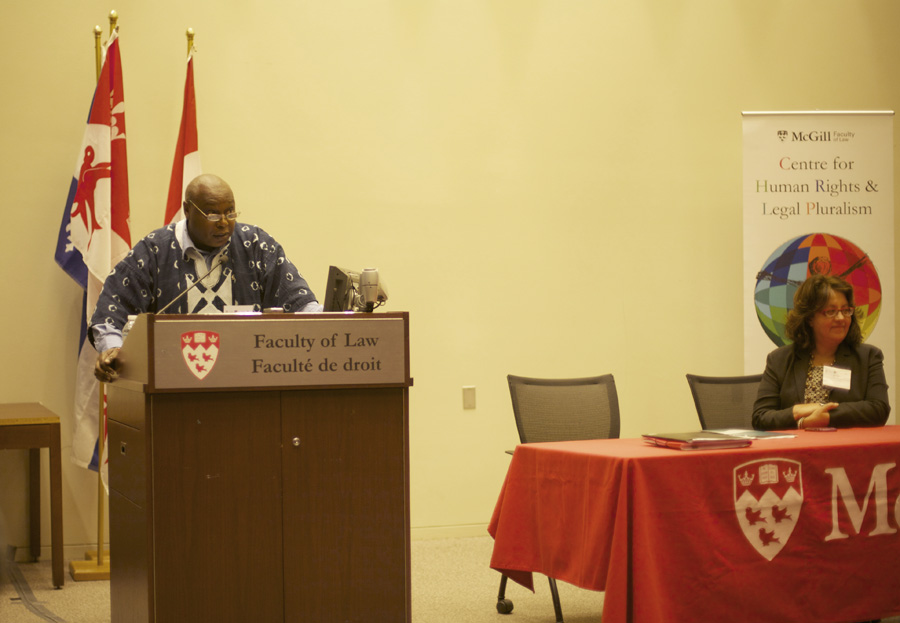Last Wednesday, United Nations Special Rapporteur Maina Kiai spoke on the challenges facing Canada and other civil societies in protecting the right to freedom of peaceful assembly and association.
Hosted by the McGill Centre for Human Rights and Legal Pluralism, the lecture was attended by approximately 50 members of the McGill and Montreal community.
In 2012, Kiai and several other specialists publically condemned the Canadian government’s reaction to the 2012 student protests against tuition increases. He pointed specifically to police reaction to the protests, as well as Bill 78—an emergency bill passed in 2012 that required protestors to give police at least eight hours’ notice of demonstrations.
“What surprises me was the reaction of the government of Canada,” he said. “It reacted very much the same way as governments that are generally known as repressive would react. I thought the Canadian [government] would be open to criticisms, open to constructive ideas, and to engage in a dialogue rather than go on the attack.”
Kiai said that, in civil societies—where individuals and non-governmental institutions seek to improve the welfare of citizens—associations and protests should be able to form without registration with, or authorization from, the government.
“You don’t need to get authorization from the government in order to have peaceful protest,” he said. “Notification rather than authorization is what is important.’’
As a Special Rapporteur for the UN, Kiai cannot impose laws upon Canada or any country he inspects. However, Kiai emphasized the importance of countries creating laws that uphold the international sanctions on the rights to freedom of assembly and association that he recommends.
“All we can do is put [the sanctions] out and hope that people will pick it up in their daily work,” Kiai said. “I can condemn the city of Montreal, but beyond that it is up to you guys [.…] The sanctions need to be done in Canada, by Canadians through Canadian mechanisms; we can only support them.”
Kiai added that government relations within civil societies have to be both transparent and expressive.
“Any state that wants to know how its people are feeling should give them the space to express that,” Kiai said. “A state that really cares for its people should be able to allow as much space for protest and for speaking out as it can.”
Pearl Eliadis, a professor at McGill’s Faculty of Law and co-organizer of the event, said that the purpose of hosting the event was to raise awareness of the importance of freedom of assembly and association, and to enable students to protect themselves through knowledge of their human rights.
According to Eliadis, these topics are particularly important in light of the Maple Spring student protests.
“Freedom of association and assembly are obviously of great issue to Quebec given the Maple Spring, but also we’re starting to see the connection with the international and global issues on the repression on civil societies,” Eliadis said. “Students need to be engaged, but at the same time, they need to be able to protect themselves. [It’s] an issue around making sure they’re safe and that they understand their rights and responsibilities.’’
Eric Moses Gashirabake, a First Year law student who attended the event, praised Kiai’s promotion of awareness of the barriers faced by civil societies around the world. Gashirabake pointed to Kiai’s experience in Kenya, where he worked as the chairman of Kenya’s National Human Rights Commission.
“[Kiai] is in a minority of activists in Kenya doing amazing things to promote democracy,” Gashirabake said. “From someone who is going on the ground not just in Kenya but internationally to look at the similarities and points of convergence [in different civil societies], it’s a nice opportunity for us students—regardless of what we’re studying—to know that this is a civic duty that we can all be engaged in.”
The speech was one of two public lectures preceding Kiai’s presentation of the first full report of his findings from his time assessing freedom of assembly and association in various countries to the UN in New York on Oct. 29.







